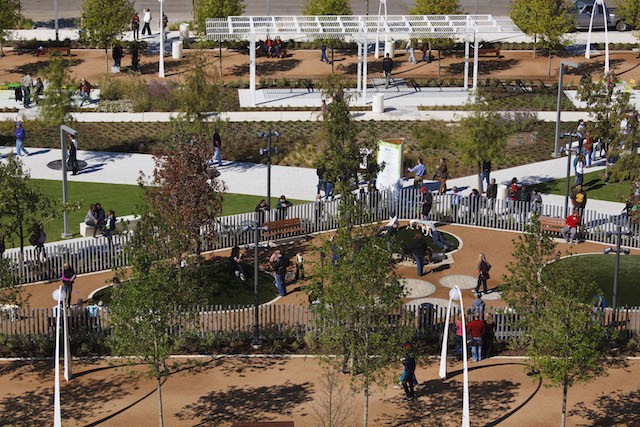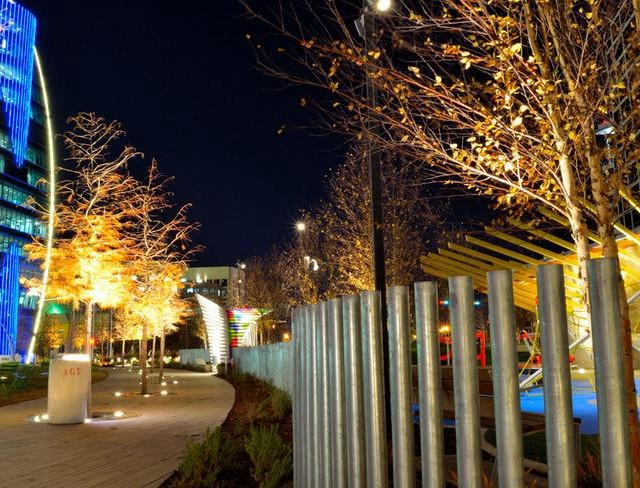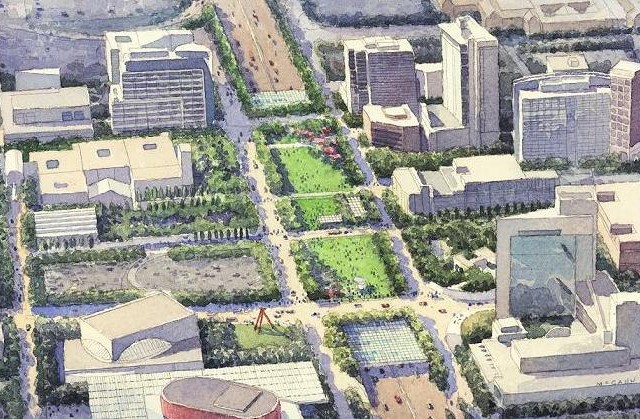The Soul of America's Urban Park Machine
by Mike Nagel

For a while I was spending every afternoon in Klyde Warren Park. I went there for the same reason everybody went there. I went there to be happy. Why else would you go to the park? I walked over on my lunch break, down St. Paul Street, past the gaudy Baptist church, past the Pearl Cup coffee shop, past the Dallas Museum of Art. I sat in the uncomfortable green metal chairs and I read books. Did I spend time at Klyde Warren Park or in Klyde Warren Park? Prepositions in this case make a difference.
I spent an afternoon with the old man who hands out the board games. I didn’t ask him what his name was but he looked like a Walter. He was wearing a beige, brandless baseball cap and a blue Klyde Warren polo shirt. I asked him which games were the most popular and he said Checkers then Chess then Scrabble, which I probably could have guessed. We were sitting on the green metal chairs next to his rolling cart and not a single person came by all day. Walter just sat there looking out at the grass, and past the grass, the skyscrapers. I thought I was probably bothering him. It was cold and cloudy and the park was practically empty.
Why was this game rental cart even here?
I asked Walter if he liked his job and he said he liked his job fine. I asked him how he’d gotten his job and he said, I applied for it. And the more I thought about this cart the more I wondered if its function was more to be here than to be used, if it was more important for people to have the option to play games than it was for them to play games. People just like knowing it’s here.
“Choice should be built into the basic design,” William Whyte wrote in The Social Life of Small Urban Spaces, a thin little book about plaza usage in Manhattan. The game cart was here for people to say no to.
Before I left, a manager came by with a clipboard and asked Walter which games people were using, which games people weren’t using, which games were missing pieces. She said, It’s almost summer and we’ve got a serious checkers shortage on our hands.
The more time I spent in Klyde Warren the more I saw the park as a meticulously maintained machine. There were workers everywhere all the time, half a dozen at least, if not a lot more. I watched one man on his knees digging mud out of a drain with his bare hands. He didn’t get a drop of it on his bright white uniform. Workers picked empty wrappers out of people’s hands before they could even set them down. I never once saw a piece of litter in Klyde Warren Park. And so while I wanted to believe I was here for the nature, that it was the nature that was making me happy, there really wasn’t anything natural about this place. It was as artificial and constructed as anything else in the city, if not more so. On various days, different sections of grass were roped off to encourage even wearing.
And yet I did feel happy here. Everyone felt happy here. They changed the moment they walked in. Their faces brightened up. I watched one man in what must have been a thousand dollar suit pick his daughter up out of her stroller and twirl her around in the air. He had a pocket square in his breast pocket and his hair was combed and shining. Something about the park reminded people to be happy. Maybe what reminded people to be happy was that other people were happy here too.
“What attracts people most,” Whyte observed, “is other people.”
Well of course there was also the food. Just before lunch five food trucks would pull up next to the curb and people would start getting in line. There was Gandolfonos Sandwiches, Abe’s Flava Flave, Nammi Bahn Mi, What’s the Scoop?, and a truck that sold nothing but sushi and snow cones. Sometimes the lines got so long it took half an hour to get your food. There were better, cheaper, faster restaurants all over the city but this was where people came. This was where people came because this was where people come. “How’s business?” I asked the guy taking my order at Abe’s Flava Flave. I wondered if he was Abe. “Man,” he said, “We can’t even keep up. We’re hiring.” He pointed to a sign taped to the window that said, “We’re hiring.” He handed me my gyro and I ate it by the fountains.
One day the children’s park was closed for repairs and the children stood outside the fence watching the repairmen work.

I came to the park on a Tuesday night after work. It was calmer now but still not empty. In the middle of the grass, a tall guy in biker shorts was leading an “insane workout.” Twenty people were mirroring his every move back to him. It must have been 64 degrees out here, the perfect temperature. The clouds were thin, transparent streaks and they were turning electric orange. The sun was going down. Klyde Warren was built over Woodall Rodgers freeway and cars were turning on their headlights. They disappeared under the park and reappeared on the other side. The movement of the cars made the park seem still by contrast. Watching the traffic was like watching a river, almost no different. I got a text from my friend Josh. He said, “I can see you.” He and Kyle were in the glass pub across the park. “Come have a beer with us,” he said. It was dark when I left the pub, two beers later, and the park was lit up with halogen lights. It was almost empty but not quite. I wondered if it was ever empty. I liked to think not.
The park was always different but always the same. There were always children but never the same children. Always business people but never the same business people. The food trucks rotated daily and I never learned their schedule. Luck of the draw. Sometimes I came with friends but mostly I came alone. I sat near the rolling bookshelves and put my feet up on the chair across from me. I never met anyone new. I waved at Walter and he lifted his fingers off his rolling cart. Whyte: “Plazas are not ideal places for striking up acquaintances, and even on the most sociable of them there is not much mingling… the nearest thing to an exchange is what Erving Goffman has called ‘civil disregard.’”
Even still, I felt connected to this park, and through this park, this city. It doesn’t take much. I came here every afternoon for two weeks. I walked the same route here and back, up and down St. Paul Street, until it became as familiar as anything else in my life. I felt like I was getting to know the park. Maybe I was becoming part of it. Downtown Dallas is not a very inviting place (coffee shops close at 6pm) but in the park I felt welcome.
What are the most popular games? I asked the old man at the game cart. There was a different old man working the cart today. His eyebrows reached up to his bangs. He had friendly looking eyes. He said, Oh, Chess or Checkers probably. Maybe Scrabble.
I’m not sure why I was so interested in which games people played but every time I saw someone new at the game cart I asked them the same question. Maybe I was hoping to learn something surprising, a telling fact that would explain something (everything?) about the people in this park. But the only thing I could learn was that they liked the same three games as everyone else in the world, which was maybe more significant than it seems. Dallas is a stereotype — a caricature. People think we’re a backwards city full of cowboys and oilmen, which is a little bit true but not entirely true. One afternoon in the park a reporter from NPR asked me what I thought about the city. She was doing a story about how the rest of the country sees Dallas. How does the rest of the country see Dallas? I asked her. They think Dallas is nothing but hicks and televangelists, she said.

The weather was getting warmer. It was almost May. The sushi/snow cone food truck was getting a lot of business. When I walked through the park I saw red and blue snow cones everywhere I looked. They caught the sun and glowed like cups full of neon. The children’s park was fixed and kids were running through the fountains. They were running through the fountains screaming as loud as they could. The park was getting busier, packed. There’s a tipping point where Whyte’s theory about people attracting more people no longer applies and that tipping point comes when there is no longer anywhere to sit. I went to the park less and less. I went to coffee shops instead, or to the underground tunnels. I drank cappuccinos. Sometimes I walked to the park and back but didn’t go in. I got to the curb and turned around. Then I stopped going to the park at all. I lost the desire. It seemed further and further away. I liked having the option of going to the park more than I liked going to the park. It was there for me to say no to.
Which games are the most popular? I asked the kid working the game cart. There was a kid working the game cart today. This was one of my last afternoons in the park. It was 80 degrees and getting hotter. I’d been in the sun for hours. The grass looked fake green. The kid looked 18 years old. This must have been his summer job. Chess, he said. Maybe checkers. What about Scrabble? I said. Oh yeah, he said, Scrabble. And I nodded and knocked my knuckles against the cart like I was asking for good luck.
Do you want to rent one? The kid asked.
Of course not, I said and we both shrugged at exactly the same time.
Mike Nagel is a writer in Dallas.
Images from Klyde Warren Park and Brett Chisum.
